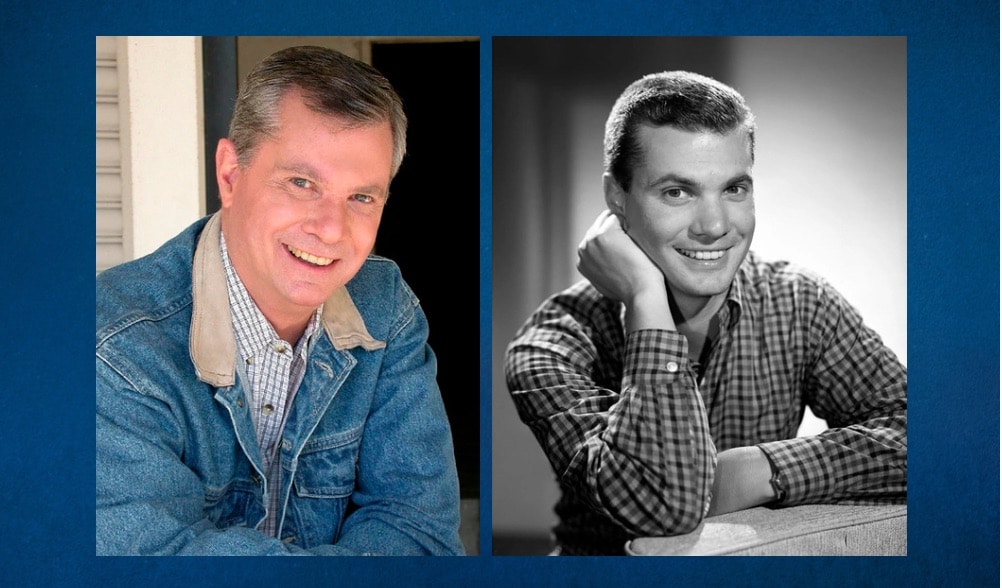ANDREA PLATE WRITES – The outpouring of grief that followed the death this week of actor Dwayne Hickman at age 87, star of the smash 1959-1963 CBS TV series “The Many Loves of Dobie Gillis,” came as no surprise.
Yes, he was just an actor in a role: a clean-cut, buttoned down, lovestruck and lovelorn aging adolescent (playing a 17-year-old at the series start, age 25 in real-life). He was the perennial straight man, the fabulous foil to actor Bob Denver’s preternaturally beatnik, hippy dippy best friend “Maynard.” But he was so much more! Dwayne Hickman became, if inadvertently, a sign of the times: status quo versus counterculture; advocate for romantic love, not global war; citizen of a small neighborhood community rather than a tortured global society. Dobie had no demons, other than his ill-fated penchant for girls.
They were happier times. As the show ended in 1963, the Vietnam War was on the rise. Still, Dwayne Hickman remained, as per his aptly titled memoir, Forever Dobie—an indelible image of all things red, white and blue on those miniscule black-and-white TVs.
A lesser man might have bemoaned the fate that followed: Industry typecasting. The stunted, stubborn collective consciousness of an American public who only, or primarily, saw him as Dobie. A man trapped in an adolescent’s frame and fame.
Not Dwayne. While other young stars have so notoriously crashed and burned, he shone. There was the 1971 pilot for a new sitcom, “Whatever Happened to Dobie Gillis?”; a 1988 TV movie, “Bring Me the Head of Dobie Gillis;” his hilarious “Uncle Jed,” a drunk disguised as a preacher in the Jane Fonda, Lee Marvin blockbuster movie “Cat Ballou” (1965); and the role of “Fred Sanderson,” a lighting emporium owner hoping to pawn off his daughter to a wealthy man in the Will Ferrell movie “Night at the Roxbury.” Like so many actors, he, too, ventured into off-camera roles: Director. Producer. CBS executive.
Perhaps he was happiest in his final act, off-stage: as a commercially successful oil painter of brightly colored, bucolic landscapes, shown in cross-country galleries and tours. By then, he had a (third) wife, actress and voice-over talent Joan Roberts Hickman (his love of 38 years, ending in death), a second son, and a new life.
But his life was not all laughs. An extra at age 6, it would be years before he found the fame his talent deserved. “I think it’s untenable to put a child actor into the business,” he said, in an interview for my book on child actors. “It would be like asking him to come here and be a CBS executive.” Nor was he always sure he wanted to act. How many Hollywood stars earn a BA degree in economics from a Jesuit university? (Class of ’56, from Loyola, now known as Loyola Marymount University).
I confess. Coincidentally, and ironically, Dwayne Hickman actually became, for me, the guy next door, when I moved from a Manhattan high-rise to live for two decades in a Santa Monica, California condo. Will I ever forget that zany, over-zealous real estate agent who cooed, pointing to unit #1, “Dobie Gillis lives here!”
No wonder the outpouring of grief has been profound. Here was a man who lived, and acted, the American dream: Humble beginnings, a meteoric rise to fame, a graceful end.
Job well done, Dwayne.
Andrea Plate, AMI’s senior editor (writing), is a former Hollywood child actress and author of the well-reviewed ‘Pretty Babies’ book on child actors.

